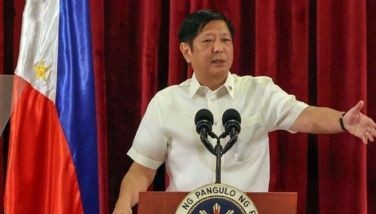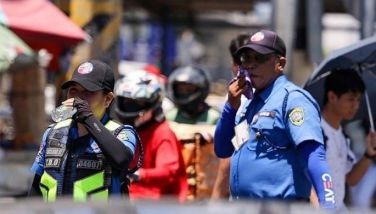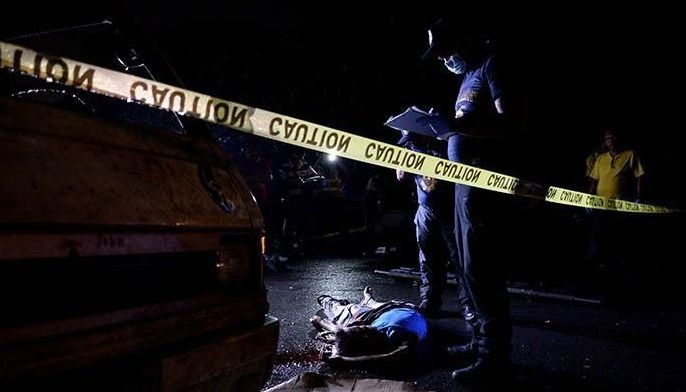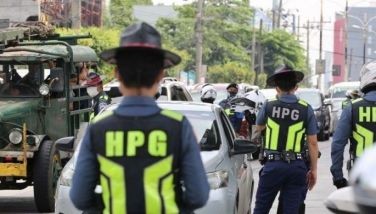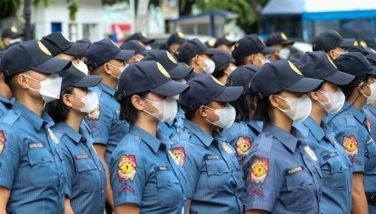'Mother of red-tagging': No process yet to remove names from terror list
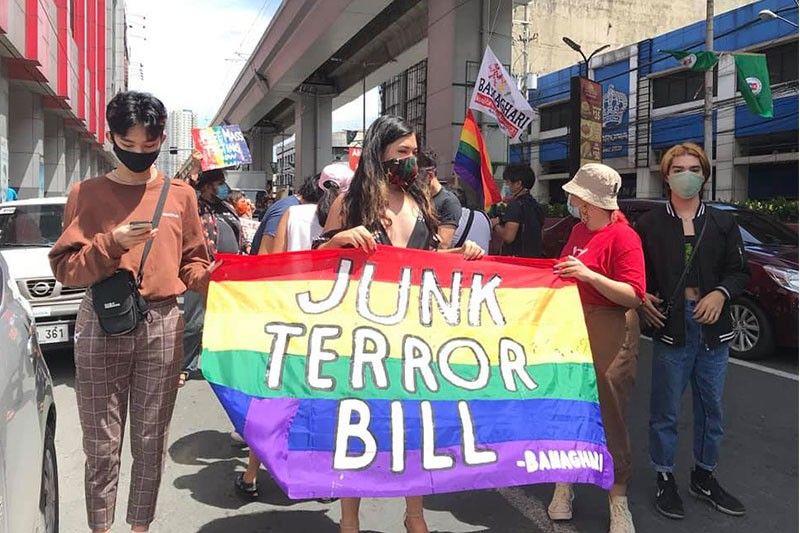
MANILA, Philippines — The Implementing Rules and Regulations of the Anti-Terrorism Law released last week allow the government to publish its list of suspected terrorists online and in the national dailies.
It is yet unclear, however, how people included in those lists can have themselves removed.
Justice Undersecretary Adrian Sugay told Philstar.com in a message that delisting will up to the Anti-Terrorism Council, which, he said "will need to promulgate its own internal rules regarding delisting."
To date, no internal rules for the council have been crafted. Sugay, spokesperson of the ACT, said: "Hopefully, it becomes part of the agenda during one of the coming ATC meetings."
Sugay said that the council meets every last Wednesday of the month.
Petitioners have been running to the Supreme Court in batches to assail the anti-terror law, many citing their own experiences of being accused of being "terrorist sympathizers" or even "terrorists" themselves.
The practice, Muslim Filipinos as well as activists and labor leaders said, puts lives at risk.
RELATED: #ChallengeAccepted: Influencers can go beyond 'good vibes' and drive discourse on national issues
Publication of list and delisting
Rule 6.5 of the IRR states that Anti-Terrorism Councils resolutions of designation will be published on its website, in the Official Gazette, and in a national newspaper. Online lists will include the name of the person, a brief description of the case for designation and date of designation or last review of designation.
Those designated as suspected terrorists may file a verified request for delisting with the ATC within 15 days of publication of the lists. The appeal may be filed more than once, but if denied, the next request can only be filed six months later.
According to the implementing rules, the ATC shall issue a resolution of delisting that will be published in national newspaper and the websites of the Official Gazette and the ATC.
Sen. Panfilo Lacson, proponent of the law, said in an interview with CNN Philippines’ "The Source" on Tuesday, that the law did not include the publication of names of people suspected of being terrorists or terrorist supporters.
The lawmaker said he sees the purpose of the publication of names as "so the person can defend or ready on whatever prospective action can be taken against him, like freezing of accounts."
Bayan Muna: Published list the 'mother of red-tagging’
Bayan Muna, a party-list long accused of being a front for communist rebels, however said that the IRR’s Rule 6 "only worsened the repressive power of the Anti-Terrorism Council to destroy a person or organization... by mere 'designation' of that person or organization as a 'terrorist.'"
"The IRR requirement that your designation as terrorist be published in newspapers and online is the mother of all red-tagging," Bayan Muna, one of the 37 groups of petitioners against the anti-terrorism law, said in a statement.
"And to think, they do not even need to file a case against you in court but just to red tag you," it added.
READ: In 13th petition filed, journalists and artists warn anti-terror law to further embolden red-tagging
Philippine jurisprudence defines red-tagging as the act of labelling, branding, naming and accusing individuals and/or organizations of being left-leaning, subversives, communists or terrorists (used as) a strategy... by State agents, particularly law enforcement agencies and the military, against those perceived to be ‘threats’ or ‘enemies of the State.’”
The faces of rights lawyer Benjamin Ramos, relief worker Jory Porquia and Karapatan paralegal Zara Alvarez were plastered on posters accusing them of supposed "CNN" — a government abbreviation for Communist Party of the Philippines-New People's Army-National Democratic Front — personalities.
The three, along with peace consultants Randy Malayao and Randall Echanis, and dozens of other humanitarian and environmental workers were later murdered.
Military and police officers have already actively and publicly red-tagged activists and even lawmakers with the Makabayan bloc — which includes Bayan Muna — who have been critical of the Duterte administration.
The ATC, whose members are Cabinet secretaries appointed by the president, have military backgrounds and have a history of red-tagging.
RELATED: Dura 'Likes': PNP social media rules and what police actually post | PNP 'art' tags activists as terrorists amid debate on anti-terrorism bill
A report prepared by the Department of Foreign Affairs, “The Philippine Human Rights Situationer,” called representatives of Bayan Muna, Anakpawis, Gabriela and Alliance of Concerned Teachers as representatives of party-lists created by the Communist Party of the Philippines.
RELATED: DOJ to review report uploaded on website that red-tagged lawmakers
'Even at the start, you will be at a disadvantage'
In an interview with Dobol B sa News TV on Tuesday, Integrated Bar of the Philippines national president Domingo Egon Cayosa pointed out that designated terrorists would not be informed before their names or organizations would be published.
"Even at the start, you will be at a disadvantaged. You are already prejudiced (against). Your security is threatened. People can take action against you. You are not protected at all," Cayosa said.
National Union of Peoples Lawyers Edre Olalia meanwhile said that the publication of names "without due process and no immediate relief and redress for irreparable damage, stigma and violation of rights to presumption of innocence."
Not the first time: Narcolist, 'Bikoy' matrices
The publication of a list of persons or organizations designated as terrorists would not be the first time that the Duterte administration would be releasing names accused of committing crimes without giving them an opportunity to refute the allegations.
President Rodrigo Duterte, mere months into his term, read a long list of names of personalities allegedly involved in the illegal drug trade in August 2016. The names included politicians, government officials and even judges. Subsequent narco-lists were also published.
Some of the local officials on the "narco list" were later killed.
Malacañang in 2019 said that a "matrix" of human rights lawyers and journalists published in a piece in the Manila Times was authentic. The personalities in the charts that were leaked to the Manila Times were accused of involvement in the release of anonymous "Ang Totoong Narcolist" videos alleging the Dutertes are involved in illegal drugs.
The Palace, two weeks later, released an expanded matrix of personalities that it claimed were working together in a “deliberate attempt to discredit this administration.”
The matrix included Olympian Hidiyn Diaz and broadcaster Gretchen Ho although the Palace later said they were not part of the supposed plot.
RELATED: Palace-vetted 'conspiracy matrix' to oust Duterte has errors | Palace's new 'ouster' matrix ludicrous, dangerous — groups
Looming battle at the court
IBP’s Cayosa said that the law violated the principle of checks and balances among branches of the government. He noted that when the executive branch, such as law enforcers deemed a person committed a crime, they should immediately bring the person to the courts, the Judiciary.
"The court is independent of the executive branch that will scrutinize that. There is check and balance, but here, there is nothing such as that," he said in a mix of English and Filipino.
Rep. Vicente Veloso (Leyte, 3rd District) ran to the courts to assail his inclusion on the narco list. In a recent ruling by the Court of Appeals Former Special Eighth Division, the court ordered the government to produce data on Veloso’s inclusion on the narcolist.
In the same ruling, the CA pointed out “[t]hat a man may be denied his rights at the mere whim of government, is anathema to a democracy, if the ideal that indeed freedom prevails in or land is to be upheld.”
With the IRR of the law out, petitioners are pressing the court to rule on their prayer, including a temporary halt order against the implementation of the law but the high court has yet to set date for the oral arguments.
- Latest
- Trending


















